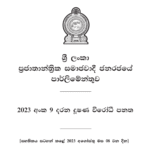Lending money and giving loans, also called “commercial credit,” are crucial for business and economic growth. Lenders usually require “security” from borrowers, which is a legal claim on property to ensure repayment.
Lenders, including banks and financial institutions, support the economy by providing funds for businesses and individuals. To protect these institutions, governments have created laws to help them recover loans quickly and efficiently. If lenders cannot recover loans easily, they may fail, impacting the entire economy.
In Sri Lanka, most loans are given by banks or institutions regulated by the Central Bank. To help lenders recover their money faster, laws have been introduced, including:
- The Civil Procedure Code (Chapter LIII)
- Mortgage Act No. 6 of 1949
- Debt Recovery (Special Provisions) Act No. 2 of 1990
- Recovery of Loans by Banks (Special Provisions) Act No. 4 of 1990
- Related provisions in acts governing specific banks like the Bank of Ceylon and People’s Bank.
Civil Procedure Code (Chapter LIII)
The Civil Procedure Code includes a “Summary Procedure” that simplifies debt recovery for clear monetary claims like unpaid bills or loan agreements.
Lenders file an affidavit confirming the debt and submit relevant documents. Borrowers must respond within a set time, either paying the debt or providing a valid defense. If the borrower doesn’t respond or fails to provide a solid defense, the court issues a decree in favor of the lender without needing a full trial.
This process ensures lenders have a quicker way to recover debts compared to traditional legal procedures.
Mortgage Act No. 6 of 1949
The Mortgage Act focuses on recovering loans backed by property (mortgages). It addresses common issues faced by lenders and ensures:
- Proper notification of all parties involved, including secondary mortgage holders.
- Efficient auctioning of mortgaged properties to recover money.
- Protection of third parties with legal claims on the property.
The law balances the rights of borrowers, lenders, and other stakeholders, ensuring fairness while enabling lenders to recover their loans efficiently.
Debt Recovery (Special Provisions) Act No. 2 of 1990
This act was introduced to address the challenges lenders faced under traditional legal processes. It applies to institutions listed under the act and covers debts exceeding Rs. 150,000.
Key features include:
- Lenders submit affidavits as evidence when filing cases.
- Courts issue a preliminary order (Decree Nisi) that requires borrowers to respond by paying the debt, providing security, or showing a valid defense.
- If borrowers fail to respond, the court converts the preliminary order into a final judgment (Decree Absolute), enabling lenders to recover their money.
This law provides a faster and more streamlined process for debt recovery.
Recovery of Loans by Banks (Special Provisions) Act No. 4 of 1990
This law allows certain banks to recover loans without going to court through a process called “parate execution.” Banks can:
- Pass a board resolution to auction mortgaged properties.
- Notify borrowers about the auction and conduct the sale.
However, a key Supreme Court ruling has restricted banks from auctioning properties belonging to guarantors under this act. Now, only properties of the primary borrower can be auctioned.
Related Provisions in Other Acts
State banks like the Bank of Ceylon and People’s Bank follow similar laws for recovering loans. These laws also restrict the auctioning of guarantors’ properties, aligning with the Supreme Court ruling.
Conclusion
Sri Lanka’s debt recovery laws provide lenders with tools to recover money efficiently while protecting the rights of borrowers and third parties. However, delays in courts, especially during appeals, remain a challenge. Increasing the number of appellate courts and improving case management could further speed up the process.














